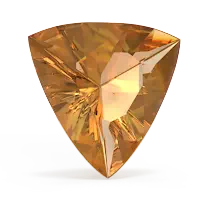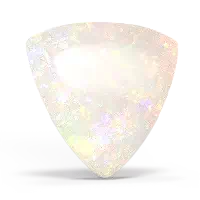
- 6 x 6 mm Trillion
- 0.70 carats
- AA Quality
- eye-clean
- Origin: Brazil

- 6 x 6 mm Trillion
- 0.70 carats
- AA Quality
- opaque
- Origin: Australia
This ring features two brilliant trillion cut gemstones, citrine and opal. The stones are set into an intricate band that curves in many different ways, creating a beautifully flowing look and feel. You can choose two different gemstones that represent your favorite colors, or perhaps the birthstones of yourself and your loved one. Citrine is known as the gem of optimism and renewal and is the birthstone for the month of November. Opal is known as the gem of brilliance and mystery and is the birthstone for the month of October.

